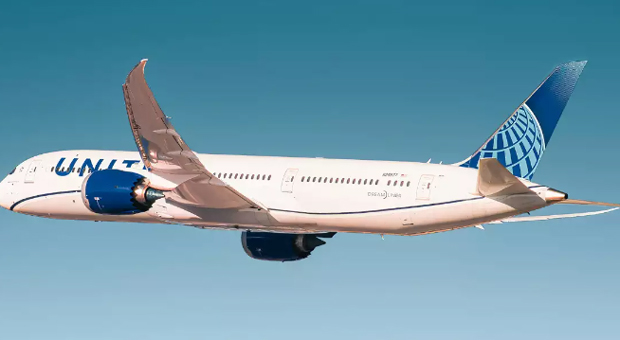A major safety issue on a fleet of Boeing 777 jets could cause fuel tanks on the planes’ wings to catch fire, causing them to explode mid-flight, according to the Federal Aviation Administration (FAA).
The newly discovered flaw was found in 300 more Boeing planes, including jets used by United and American Airlines, the FAA said.
After the issue was discovered in March, the FAA requested Boeing and other outside experts respond by May 9.
However, whether the company has acted on the safety issues is unclear.
In a statement, a Boeing spokesperson said the FAA’s notice was part of a “standard regulatory process that has helped ensure air travel is the safest form of transportation. This is not an immediate safety of flight issue.”
“There are multiple redundancies designed into modern commercial airplanes to ensure protection for electromagnetic effects. The 777 fleet has been operating for nearly 30 years, and has safely flown more than 3.9 billion passengers,” the statement continued.
It is just the latest major safety warning to be directed at the scandal-hit company by regulators — as multiple models of Boeing passenger jets have face door plug blowouts, mid-air engine fires, and two deadly crashes which killed 346 people.
SHOCK REPORT: ⚠️ New FAA notice reveals 300 Boeing planes used by American and United Airlines have potentially FATAL FLAW that may cause jets to EXPLODE mid-air…
— Chuck Callesto (@ChuckCallesto) May 22, 2024
Earlier this year, a new series of Boeing jets were discovered to have a potentially deadly defect..
The problem… pic.twitter.com/IEcvNvw5Gt
The Daily Mail reported: In this March 2024 airworthiness directive (AD) proposal, the FAA warned Boeing of an ‘electrostatic discharge,’ or static electricity risk, near the center-wing fuel tanks.
‘The unsafe condition, if not addressed, could result in an ignition source inside the fuel tank,’ the FAA said, ‘and subsequent fire or explosion.’
Earlier, a representative for the company emphasized that the FAA’s March 25, 2024 notice was for a ‘proposed rulemaking,’ seeking comment from Boeing and others before the federal agency would formally mandate any proposed fix to its 777 series of jets.
The FAA projected that the safety fix would cost Boeing — whose market cap is $113.53 billion as of this writing — less than $698,000 to correct for all of the 292 vulnerable Boeing 777 aircraft listed within the US registry.
And the parts required to remove these ‘static electricity’-based explosion risks, according to the federal agency, would only cost $98 for each Boeing 777.
The FAA specifically requested that new ‘electrical bonding’ and ‘grounding’ be installed to prevent short-circuiting or ‘electrostatic discharge’ around an air intake system near the 777’s center-wing fuel tanks.
The federal agency had based its proposal for this critical fix on its own review of a public notice by the aircraft maker, technically known as ‘Boeing Alert Requirements Bulletin 777–47A0007 RB, dated November 21, 2023.’
But, per the FAA’s March 2024 notice, the agency issued its own proposal for a new directive because ‘the unsafe condition described previously is likely to exist or develop on other products of the same type design.’
The FAA warning join controversies already swirling the aerospace giant and its ‘triple seven’ aircrafts — including Senate testimony by a whistleblower who has accused Boeing of taking shortcuts when building the 777.
‘Despite what Boeing officials state publicly, there is no safety culture at Boeing,’ whistleblower Sam Salehpour told the US Senate during open hearings last month.
‘I observed Boeing workers using improper and untested methods to align parts in the 777,’ Salehpour, once a quality engineer at Boeing, told Senate investigators.
‘In one instance even jumping on pieces of the airplane to get them to align,’ he said.
Salehpour testified that he had been ‘involuntarily transferred to the 777 program ‘in retaliation’ for his internal whistleblower activity, sounding the alarm over several, even graver risks posed by the company’s 787 Dreamliner jets.
‘I was ignored, I was told not to create delays, I was told, frankly, to shut up,’ Salehpour told the Senate’s homeland security subcommittee on investigations.
Flaws with Boeing’s 787 Dreamliner and its 777 series rose in public awareness after dire incidents occurred involving Boeing’s 737 Max, including a Boeing 737 Max 9 flight in which a cabin pressure emergency ripped clothes off of passengers.
But the FAA’s March 25, 2024 ‘airworthiness directive’ proposal to Boeing has raised new concerns about the 777 series of aircraft — which are among the bestselling long haul aircraft in the world and the first commercial jets designed entirely by computer.
The nitrogen enriched air distribution system (NEADS), which helps keep combustible oxygen away from the plane’s jet fuel, according to the FAA, ‘was installed without a designed electrical bond […] in the center wing tank.’
‘This proposed AD [airworthiness directive] would require installing electrical bonding and grounding,’ the agency wrote of the $98 worth of parts, ‘installing the cover plate assembly with new fasteners.’
The FAA has not yet responded to DailyMail.com’s requests for updates on the AD. On Monday night, it was reported that firefighters currently picketing Boeing may be on the verge of resolving their dispute with the aviation giant.
KOMO said the 125 firefighters who’ve been locked out of the firm since May 4 are considering an offer that would have increased average take-home pay to $112,000, up from $91,000 last year.
Firefighters who are striking say Boeing’s current structure for progression is too slow. The workers, who are called out to deal with accidents at Boeing’s manufacturing plants, say the aviation giant should put safety before profits.
The ongoing tussle comes as trade publication Leeham News and Analysis spoke to insiders who claimed that the company has been failing to meet other FAA-issued safety deadlines this year, including a February call for new safety plans.
Boeing was also claimed to have unsuccessfully engaged or even contacted its own engineering and technicians union for input on the new FAA-mandated safety plans.
Five models of the ‘triple sevens’ were called out by the FAA’s proposed directive this March, including the Boeing 777F, 777–200, –200LR, –300, and the –300ER, which was the exact model involved in this Monday’s fatal Singapore Airlines incident.
Singapore Airlines Flight SQ321’s fatal ‘turbulence’ incident this Monday involved proximity to tropical thunderstorms.
The Boeing 777 plane operated by Singapore Airlines left London’s Heathrow airport on Monday evening at 10:17pm local time with 211 passengers and 18 crew on board, before the fatal ‘turbulence’ event.
‘It built up, like a feeling of going up a roller coaster, up the crest, and suddenly dropping very dramatically,’ passenger Dzafran Azmir told the New York Times.
Dzafran, a 28-year-old university student, said that he personally witnessed two other passengers tending to bloody gashes on their heads following the incident.
Another passenger described feeling like ‘all hell broke loose’ as he watched ‘iPads and iPhones and cushions and blankets and cutlery and plates and cups flying through the air and crashing into the ceiling.’
The Singapore Airlines Boeing 777-300ER was diverted to Suvarnabhumi Airport in Bangkok, Thailand, where it made an emergency landing at 3:45pm on Tuesday.
Air safety investigators were dispatched to study the plane at the airport in Thailand.
In its March safety directive proposal to Boeing, the FAA said it could ultimately call for the firm to revise its ‘maintenance or inspection program’ for all five of the listed triple seven models, including the Boeing 777-300ER.
Goh Choon Phong, the CEO of Singapore Airlines, made a front-facing apology after Monday’s tragedy, explaining what is currently understood about the causes of the ‘extreme turbulence’ incident in a video posted to the company’s Facebook page.
‘We are deeply saddened by this incident,’ Phong said. ‘On behalf of Singapore Airlines, I would like to express my deepest condolences to the family and loved ones of the deceased.











